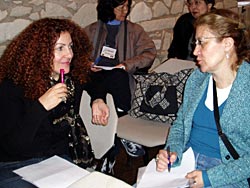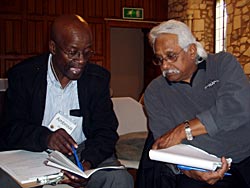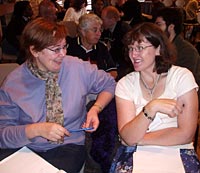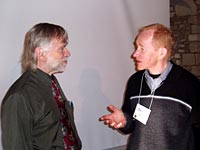 |  |
| CONFERENCE MENU | ||
| See information on our 2007 Conference | ||
July 23, 2006
July 24, 2006
Pre-Conference Workshops
Choose one of the following workshop options for each day:
July 23, 2006
Foundational Workshop:
An Introduction to the Fundamentals of Critical Thinking…Dr. Linda Elder
Foundational concepts in critical thinking will be covered in this session, while more specific dimensions of critical thinking, or a more advanced approach, will be the focus of International Conference sessions. This session, then, lays the foundation for the other sessions. It will introduce you to the basic components of critical thinking, ways to build those components into the design of what you teach, and ways to make that design effective. In all conference sessions, we understand critical thinking not as something additional to content, but rather as skills, insights, and values integral to understanding and internalizing content. We focus, therefore, on illustrating how students can come to see what they are learning not as random bits and pieces of information to be memorized, but as a system with a definite set of logical relationships, an organized structure of concepts, principles, and understandings they must think their way through in order to learn content.
Socratic Questioning: Formulating and Asking Questions That Target the Analysis and Assessment of Thinking …Dr. Gerald Nosich
All thinking is driven by questions. Good questions generate good thinking. Bad questions generate bad thinking. Deep questions, deep thinking. No questions, no thinking. To think well about thinking we need to learn how to ask questions that take thinking apart and reveal to us how the parts of our thinking are functioning together. In this session, Gerald Nosich will provide an introduction to the theory and practice of Socratic Questioning, through emphasis on the analysis and assessment of reasoning. Participants will be engaged in Socratic dialogue, and will gain introductory experience in Socratic questioning, that with practice can lead to an increasingly richer understanding of the power inherent in disciplined questioning as a tool of both teaching and learning.
Socratic Questioning: Using Questions as a Primary Vehicle in Teaching and Learning…Dr. Richard Paul
 It is not possible to be a good thinker and a poor questioner. Questions define tasks, express problems, and delineate issues. They drive thinking forward. Answers, on the other hand, often signal a full stop in thought. Only when an answer generates further questions does thought continue as inquiry. A mind with no questions is a mind that is not intellectually alive. No questions (asked) equals no understanding (achieved). Superficial questions equal superficial understanding, unclear questions equal unclear understanding. If your mind is not actively generating questions, you are not engaged in substantive learning. Thinking within disciplines is driven, not by answers, but by essential questions. Had no basic questions been asked by those who laid the foundation for a field - for example, physics or biology - the field would not have been developed in the first place. Every intellectual field is born out of a cluster of essential questions that drive the mind to pursue particular facts and understandings. Biology was born when some humans pursued answers to the questions: "What are the characteristics of living systems? What structures exist in them? What functions do these structures serve?" Biochemistry was born when biologists began to ask questions such as: "What chemical processes underlie living things? How and why do chemical processes within living things interact and change?"
It is not possible to be a good thinker and a poor questioner. Questions define tasks, express problems, and delineate issues. They drive thinking forward. Answers, on the other hand, often signal a full stop in thought. Only when an answer generates further questions does thought continue as inquiry. A mind with no questions is a mind that is not intellectually alive. No questions (asked) equals no understanding (achieved). Superficial questions equal superficial understanding, unclear questions equal unclear understanding. If your mind is not actively generating questions, you are not engaged in substantive learning. Thinking within disciplines is driven, not by answers, but by essential questions. Had no basic questions been asked by those who laid the foundation for a field - for example, physics or biology - the field would not have been developed in the first place. Every intellectual field is born out of a cluster of essential questions that drive the mind to pursue particular facts and understandings. Biology was born when some humans pursued answers to the questions: "What are the characteristics of living systems? What structures exist in them? What functions do these structures serve?" Biochemistry was born when biologists began to ask questions such as: "What chemical processes underlie living things? How and why do chemical processes within living things interact and change?"
Every field stays alive only to the extent that fresh questions are generated and taken seriously as the driving force in thinking. When a field of study is no longer pursuing significant answers to essential questions, it dies as a field. To think through or rethink anything, one must ask the questions necessary to thinking through the logic of that thing, clearly and precisely.
In this session, we introduce essential questions as indispensable intellectual tools in both teaching and learning. We focus on principles essential to formulating, analyzing, assessing, and settling primary questions. Because we cannot be skilled at thinking unless we are skilled at questioning, we strive for a state of mind in which asking essential questions becomes second nature - both for us as teachers, and for our students as learners. Asking essential questions is a key to productive thinking, deep learning, and effective living.
Critical Thinking: The Key to Survival in a World of Accelerating Change, Intensifying Complexity and Increasing Danger …Dr. Linda Elder
The world is swiftly changing and with each day the pace quickens. The pressure to respond intensifies. New global realities are rapidly working their way into the deepest structures of our lives: economic, social, cultural, political, and environmental realities - realities with profound implications for thinking and learning, business and politics, human rights and human conflicts. These realities are becoming increasingly complex; many represent significant dangers and threats. And they all turn on the powerful dynamic of accelerating change.
 Can we deal with incessant and accelerating change and complexity without revolutionizing our thinking? Traditionally our thinking has been designed for routine, for habit, for automation and fixed procedure. We learned how to do our job once, and then we used what we learned over and over. But the problems we now face, and will increasingly face, require a radically different form of thinking, thinking that is more complex, more adaptable, more sensitive to divergent points of view. The world in which we now live requires that we continually relearn, that we routinely rethink our decisions, that we regularly reevaluate the way we work and live. In short, there is a new world facing us, one in which the power of the mind to command itself, to regularly engage in self-analysis, will increasingly determine the quality of our work, the quality of our lives, and perhaps even, our very survival.
Can we deal with incessant and accelerating change and complexity without revolutionizing our thinking? Traditionally our thinking has been designed for routine, for habit, for automation and fixed procedure. We learned how to do our job once, and then we used what we learned over and over. But the problems we now face, and will increasingly face, require a radically different form of thinking, thinking that is more complex, more adaptable, more sensitive to divergent points of view. The world in which we now live requires that we continually relearn, that we routinely rethink our decisions, that we regularly reevaluate the way we work and live. In short, there is a new world facing us, one in which the power of the mind to command itself, to regularly engage in self-analysis, will increasingly determine the quality of our work, the quality of our lives, and perhaps even, our very survival.
If we are to take up the challenge of becoming critical thinkers, we face a battery of hitherto unanswered questions, questions at the heart of this session. This question-centered agenda provides the impetus for reformulating our worldview. Through it we can appreciate the intellectual work required to change our thinking in foundational ways. Through it we can grasp the need to regularly re-examine the extent of our ignorance. Through it we can grasp the need for regular exercise of disciplined thinking. Through it we can understand the long-term nature of intellectual development, social change, and personal growth and transformation.
Critical Thinking Competency Standards: Using Critical Thinking to Assess Student Learning Within a Discipline…Dr. Gerald Nosich
Much lip service is given to the notion that students are learning to think critically. A cursory examination of critical thinking competency standards (enumerated and elaborated in this session) should persuade any reasonable person familiar with schooling today that they are not.
Critical thinking competency standards, which are the focus of this session, serve as a resource for teachers, curriculum designers, administrators and accrediting bodies. The use of these competencies across the curriculum will ensure that critical thinking is fostered in the teaching of any subject to all students at every grade level. These competency standards can be found in A Guide for Educators to Critical Thinking Competency Standards: Standards, Principles, Performance Indicators, and Outcomes With a Critical Thinking Master Rubric, which will be provided to all conference participants and will be used throughout this session.
This guide, Critical Thinking Competency Standards, provides a framework for assessing students’’ critical thinking abilities. It enables administrators, teachers and faculty at all levels (from elementary through higher education) to determine the extent to which students are reasoning critically within any subject or discipline. These standards include outcome measures useful for teacher assessment, self-assessment, as well as accreditation documentation. These competencies not only provide a continuum of student expectations, but can be contextualized for any academic subject or domain and for any grade level. In short, these standards include indicators for identifying the extent to which students are using critical thinking as the primary tool for learning.
By internalizing the competencies, students will become more self-directed, self-disciplined, self-monitored thinkers. They will develop their ability to:
In this session, participants will work their way through many of the critical thinking competency standards. Participants will think through how these standards can and should be applied to teaching, learning and assessment in their subject or discipline, in their school or college
call 800.833.3645 to register.
| CONFERENCE MENU | ||
| See information on our 2007 Conference | ||